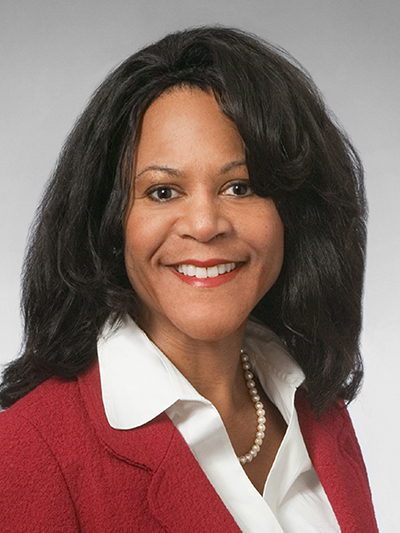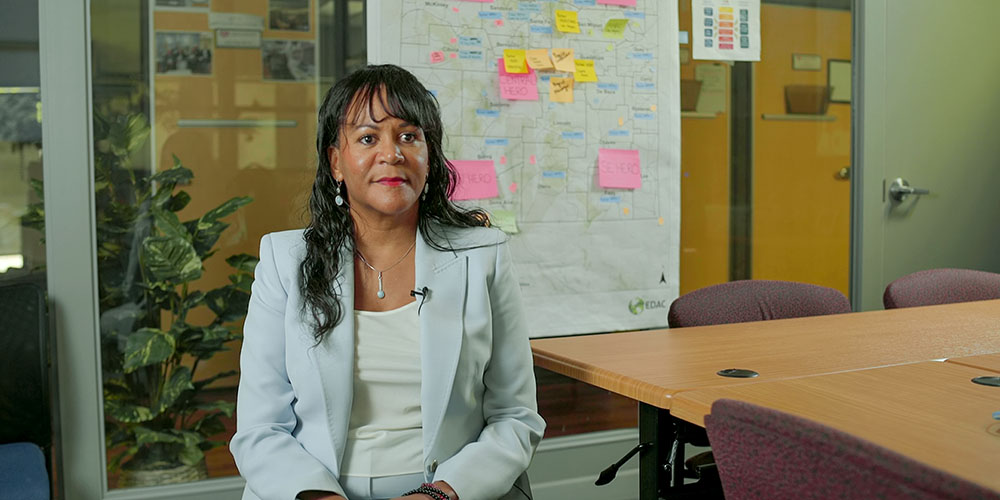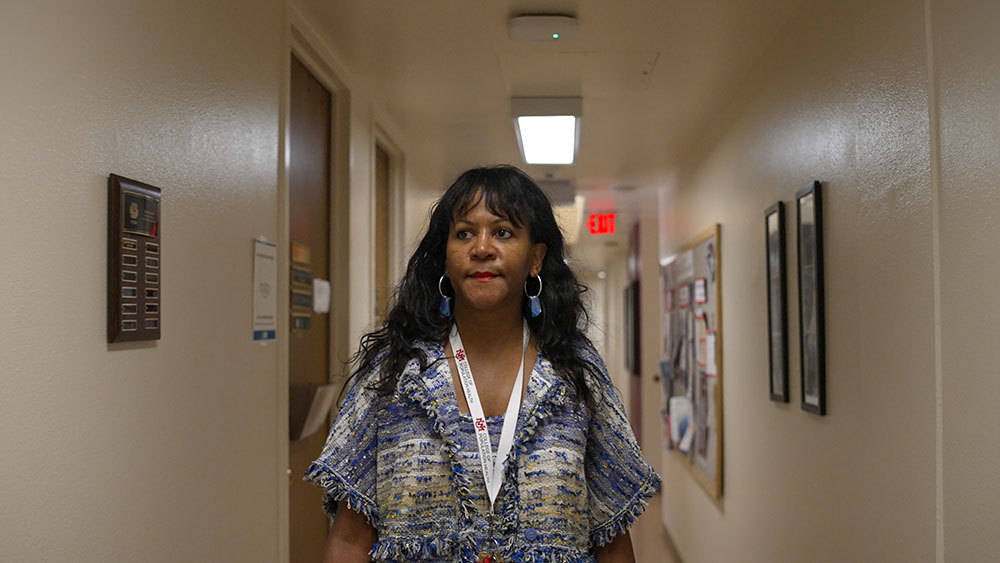 “Health is a human right. And we are a college that supports that.”
“Health is a human right. And we are a college that supports that.”
With that in mind, as dean of The University of New Mexico College of Population Health, Tracie Collins, MD, MPH, aims to drive the college in a direction that will grow the health care work force, as well as population health and public health so that it’s inclusive of thoughts and ideas from New Mexico’s diverse community of Native American, Latinx, African American and Asian American people.
“We are really looking to make a huge difference in the state of New Mexico when it comes to health and health outcomes,” she says.
A medical doctor and vascular specialist with a clinical practice at UNM Hospital, Collins served as the state Secretary of Health at the height of the COVID-19 pandemic and the vaccine rollout.
In addition to her administrative role in leading the College of Population Health, Collins also sees patients a half-day each week in the vascular medicine clinic and is taking new patients as she’s building her practice.
When Collins finds time to take a break, she enjoys traveling, riding her bicycle and going for walks, reading books and watching good movies. She also likes to spend time with her toy Maltipoo.
Prior to coming to New Mexico, Collins chaired the Department of Preventive Medicine and Public Health at the University of Kansas School of Medicine – Wichita. She joined the University of Kansas faculty in 2011 as department chair and Kansas Health Foundation Distinguished Professor.
Collins received a bachelor of science in chemistry at the University of Central Oklahoma and earned her MD at the University of Oklahoma College of Medicine. She also completed an internal medicine residency at OU, followed by fellowships in ambulatory care and general internal medicine and a master of public health degree at Harvard University.
Collins joined the Baylor College of Medicine faculty in Houston, where she ran studies of patients in the Veterans Affairs health system suffering from peripheral artery disease. The circulatory disorder has become a longstanding research interest.
Collins continued her research at the University of Minnesota, where she became an associate professor in 2006. She served as a principal investigator for an American Diabetes Association-funded trial to address the role of home-based walking for patients with peripheral arterial disease.
Collins says she found her calling to become a doctor as she witnessed the way some family members with health issues were treated.
“I perceived a lack of listening and poor communication with health care providers that led to really bad, bad outcomes,” she says. “That initially got me thinking about, ‘Do I want to go to medical school?’ or ‘What do I want to do?’ And it was after completing a chemistry course in high school and with a chemistry major in college that I thought, ‘I should just go for it.’”
I wanted to make a difference in how someone who looks like me receives health care
She adds, “I wanted to make a difference in how someone who looks like me receives health care. And I think having someone who is a doctor or a nurse or nurse practitioner who looks like me or other groups . . . really strengthens the workforce.”
Collins served as New Mexico’s health secretary for eight months, leading the state through some of the toughest days of the pandemic and making sure many residents were vaccinated.
She considers her time in state government a rewarding experience, “being a voice to help (the public) understand what's truth and what's fiction, and being able to have those conversations with multiple sectors throughout the state.”
 Though it’s been a challenge nationwide to weed out misinformation, “I think we've done a good job here in getting people to understand the value of protecting themselves and the community by getting vaccinated,” Collins says.
Though it’s been a challenge nationwide to weed out misinformation, “I think we've done a good job here in getting people to understand the value of protecting themselves and the community by getting vaccinated,” Collins says.
Getting the word out was a daily effort, she says, and it continues.
“There's also the issue of equitable distribution of the vaccine, making sure that we reach everyone to really get shots in arms and not just being comfortable with mainstream America receiving the vaccine – but everyone receiving it. And if there's more skepticism in certain groups, making the effort to help them understand the benefit of the vaccine.”
Collins was impressed with the energy and commitment from different entities such as the National Guard, the Federal Emergency Management Agency and numerous hospital partners to take care of New Mexico, she says.
“All of that made this a very rewarding experience, despite how challenging it was to be in the midst of a pandemic,” she says.
For years – or decades – public health has been underfunded, she says. With a new increase in funding for public health, she hopes to see more change in rural and underserved communities.
“The thing for me that can be disappointing is there’s still the need to help people realize the value of public health as it relates to improving health and health outcomes in the state,” Collins says.
Leveling the foundation of public health for all New Mexicans means doing more of what we're doing well, she says.
“Increasing our reach to rural areas and to underserved communities, making sure that we put funding back into the health councils because (public health workers) . . . are the people on the ground in the communities making things happen. To be able to use this funding to support those efforts is really good.”
As dean of the College of Population Health, she’s leading a culture change for it to become an anti-racist college.
“We're looking at our curriculum, and we're having regular meetings with some really excellent presentations that get to the heart of historical issues that continue to plague us today,” Collins says.
“My goal for the college is that we will be leading the charge, making sure we achieve greater health equity in the state and improving health outcomes for all the communities – whether they make up 3% of the state, 1%, or 50% – doing so by providing a strong, well-trained workforce in population health and public health. We all matter.”
Beginning in the fall of 2022, the college will have a new PhD program in health equity. Collins is also aiming to double the size of the college’s faculty, as well as increase the number of courses.
She is grateful to New Mexico voters for approving a bond that will pay for a new building to house the College of Nursing and the College of Population Health.
“Ultimately, I'd love to see our college with its own building – that's another goal,” she says.
UNM Health Sciences and Services Building, First Floor
MSC09 5235
2500 Marble Ave. NE
1 University of New Mexico
Albuquerque, NM 87131
505-272-2728
HSC-Diversity@salud.unm.edu